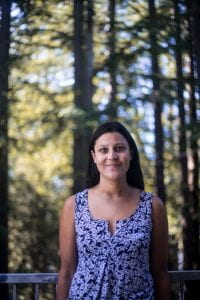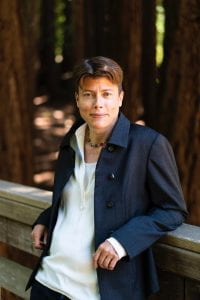Principal Investigators (PIs)
 Jennifer L. Derr is an Associate Professor of History at the University of California, Santa Cruz where she is also the Founding Director of the Center for the Middle East and North Africa. Her research explores the intersections among medicine, science, the environment, and political economy in the modern Middle East. She holds a Ph.D. in History and a B.S. in Biological Sciences from Stanford University and a M.A. from Georgetown University in Contemporary Arab Studies. Her first book, The Lived Nile: Environment, Disease, and Material Colonial Economy in Egypt (Stanford UP, 2019), chronicles the transformation of the Nile in the nineteenth and twentieth centuries to support colonial economy in Egypt, and the significance of the river’s new material environment in producing scientific and biomedical forms of knowledge, configurations of capital, and embodied subjectivities. Professor Derr’s second manuscript, provisionally entitled The Liver in Egypt: Productions of an Organ Through 20th-Century Public Health and Political Economy, traces the production of the liver as a site of knowledge, disease, and treatment in 20th-century Egypt and the significance of this history within that of biomedicine and public health in the Global South during the second half of the twentieth century. Her research has been supported by the National Endowment for the Humanities, the Hellman Foundation, the University of California Humanities Research Institute, the Fulbright-Hays Commission, the Social Science Research Council, the American Research Center in Egypt, the Mellon Foundation, and the Institute for Historical Studies at the University of Texas at Austin. In 2019, she was awarded the National Science Foundation’s 5-year CAREER grant to support a broad research agenda focused on the “History of Science at the Interface of Biomedical and Environmental Concerns.”
Jennifer L. Derr is an Associate Professor of History at the University of California, Santa Cruz where she is also the Founding Director of the Center for the Middle East and North Africa. Her research explores the intersections among medicine, science, the environment, and political economy in the modern Middle East. She holds a Ph.D. in History and a B.S. in Biological Sciences from Stanford University and a M.A. from Georgetown University in Contemporary Arab Studies. Her first book, The Lived Nile: Environment, Disease, and Material Colonial Economy in Egypt (Stanford UP, 2019), chronicles the transformation of the Nile in the nineteenth and twentieth centuries to support colonial economy in Egypt, and the significance of the river’s new material environment in producing scientific and biomedical forms of knowledge, configurations of capital, and embodied subjectivities. Professor Derr’s second manuscript, provisionally entitled The Liver in Egypt: Productions of an Organ Through 20th-Century Public Health and Political Economy, traces the production of the liver as a site of knowledge, disease, and treatment in 20th-century Egypt and the significance of this history within that of biomedicine and public health in the Global South during the second half of the twentieth century. Her research has been supported by the National Endowment for the Humanities, the Hellman Foundation, the University of California Humanities Research Institute, the Fulbright-Hays Commission, the Social Science Research Council, the American Research Center in Egypt, the Mellon Foundation, and the Institute for Historical Studies at the University of Texas at Austin. In 2019, she was awarded the National Science Foundation’s 5-year CAREER grant to support a broad research agenda focused on the “History of Science at the Interface of Biomedical and Environmental Concerns.”

Maya Peterson was an Associate Professor of History at the University of California, Santa Cruz when she died in childbirth in June 2021. Her research interests included Russian and Central Asian history, as well as the history of the environment, science, technology, and medicine. Her first monograph, Pipe Dreams: Water and Empire in Central Asia’s Aral Sea Basin, was published as part of the Cambridge University Press series Studies in Environment and History in 2019. It was a finalist for the Central Eurasian Studies Society’s 2020 Book Prize in History and the Humanities. Peterson’s research was supported by the Social Science Research Council, Andrew W. Mellon Foundation, the Fulbright Program, the Henry Luce Foundation, the Rachel Carson Center for Environment and Society at Ludwig-Maximilians-Universität in Munich, Germany, and Edrhard-Karls-Universität in Tübingen, Germany. In addition to her monograph, she published articles in Slavic Review, Cahiers du Monde Russe, and Environmental History. Professor Peterson held a B.A. in History with High Honors, Phi Beta Kappa, from Swarthmore College, and an M.A. in Russia, Eastern Europe, and Central Asia Studies and a Ph.D. in History from Harvard University, where she was also a postdoctoral fellow and lecturer in the History of Science Department.

Jennifer Reardon is a Professor of Sociology and the Founding Director of the Science and Justice Research Center at the University of California, Santa Cruz. Her research draws into focus questions about identity, justice and democracy that are often silently embedded in scientific ideas and practices, particularly in modern genomic research. Her training spans molecular biology, the history of biology, science studies, feminist and critical race studies, and the sociology of science, technology and medicine. She is the author of Race to the Finish: Identity and Governance in an Age of Genomics (Princeton University Press, 2005) and The Postgenomic Condition: Ethics, Justice, Knowledge After the Genome (Chicago University Press, Fall 2017). She has been the recipient of fellowships and awards from, among others, the National Science Foundation, the Max Planck Institute, the Humboldt Foundation, the London School of Economics, the Westinghouse Science Talent Search, and the United States Congressional Committee on Science, Space and Technology. Recently, she started a project to bike over one thousand miles through her home state of Kansas to learn from farmers, ranchers and other denizens of the high plains about how best to know and care for the prairie.
Postdoc
Anila Daulatzai is a political and medical anthropologist. She has taught in prisons, and in universities across three continents. Her past and current research projects look at widowhood, heroin use, and polio through the lens of serial war and US Empire in Afghanistan, and Pakistan. She has published articles in Jadaliyya, Al-Jazeera, several academic journals, and edited volumes and is a contributing member to Brown University’s Costs of War Project, since 2014. She is currently completing her book manuscript provisionally titled War and What Remains. Everyday Life in Contemporary Kabul, Afghanistan.
Graduate Fellows
 Aaron A. Aruck is a PhD Candidate in the History Department at UC Santa Cruz, where he has also completed a Designated Emphasis in Latin American and Latino Studies (LALS). Aruck holds a BA in History from Amherst College and a MA in History from UC Santa Cruz. Prior to graduate school, Aruck worked as a paralegal at the National Center for Lesbian Rights. Aruck’s dissertation project, tentatively titled “Tracking Contagious Cases: Venereal Disease Control and the Making of Sexual Identities in Mid-Century Mexico,” explores Mexico’s involvement in various transnational efforts between 1926 and 1960 to eradicate venereal disease and how those public health engagements shaped the sexual regulation of migrants, prostitutes, and those identified as homosexual or gender non-conforming. The dissertation contends that venereal disease control, although framed by public health officials as an inherently heterosexual concern, paradoxically helped delineate other sexual categories like the homosexual that both ensnared and privileged queer historical subjects. Aruck’s research has received support from organizations like the Social Science Research Council and The Humanities Institute at UC Santa Cruz.
Aaron A. Aruck is a PhD Candidate in the History Department at UC Santa Cruz, where he has also completed a Designated Emphasis in Latin American and Latino Studies (LALS). Aruck holds a BA in History from Amherst College and a MA in History from UC Santa Cruz. Prior to graduate school, Aruck worked as a paralegal at the National Center for Lesbian Rights. Aruck’s dissertation project, tentatively titled “Tracking Contagious Cases: Venereal Disease Control and the Making of Sexual Identities in Mid-Century Mexico,” explores Mexico’s involvement in various transnational efforts between 1926 and 1960 to eradicate venereal disease and how those public health engagements shaped the sexual regulation of migrants, prostitutes, and those identified as homosexual or gender non-conforming. The dissertation contends that venereal disease control, although framed by public health officials as an inherently heterosexual concern, paradoxically helped delineate other sexual categories like the homosexual that both ensnared and privileged queer historical subjects. Aruck’s research has received support from organizations like the Social Science Research Council and The Humanities Institute at UC Santa Cruz.
 Juliana M. Nzongo is a PhD Candidate in the Microbiology and Environmental Toxicology Department at the University of California, Santa Cruz. She holds a BA in Biology with an emphasis in Microbiology from San Francisco State University. Juliana’s dissertation is tentatively titled “Arsenic, Race and the Environment” with a wet lab emphasis on Arsenic Detoxification in Gut Relevant Bacteria. Juliana’s research has been funded by The Humanities Institute, the University of California’s Cota Robles Fellowship, The Society Of Toxicology (SOT), and The Initiative for Maximizing Student Development.
Juliana M. Nzongo is a PhD Candidate in the Microbiology and Environmental Toxicology Department at the University of California, Santa Cruz. She holds a BA in Biology with an emphasis in Microbiology from San Francisco State University. Juliana’s dissertation is tentatively titled “Arsenic, Race and the Environment” with a wet lab emphasis on Arsenic Detoxification in Gut Relevant Bacteria. Juliana’s research has been funded by The Humanities Institute, the University of California’s Cota Robles Fellowship, The Society Of Toxicology (SOT), and The Initiative for Maximizing Student Development.